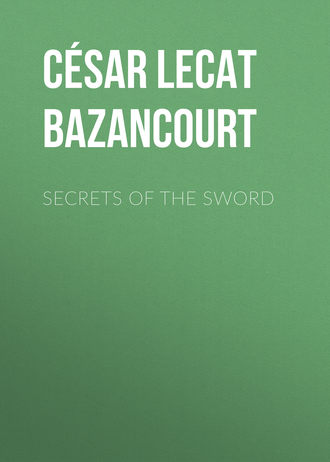
Secrets of the Sword
“Picture for yourselves two men fighting. – You see them at one moment standing their full height, the next bent double, swerving to right and left, colliding violently, and entangled in a furious encounter; suddenly they break away, recoiling from each other with a bound, rest for a moment, panting and glaring, till suddenly they renew the struggle. Do you suppose that all these intricate evolutions, and the subtle application of muscular force that they imply, can be systematically analysed and taught? Of course not.
“In every art proficiency can only be obtained by persistent and intelligent application. Practice alone makes perfect. It is by studying combinations, by trying to adapt the means at his disposal to the object in view, that the artist tests the limits of his art and discovers its hidden secrets, fashions it at will, and makes it his obedient slave.
“These remarks would not be complete, if I failed to caution you against a very pernicious habit, which one is apt to contract in the fencing-room, and which in a duel may easily lead to a fatal issue. I mean the habit of stopping after you have made a hit, instead of immediately recovering your guard and putting yourself out of distance. Never forget this important point; if you do, you may after wounding your opponent receive a mortal wound, for which you will have only yourself to blame.
“Every fencer knows how commonly it happens in an assault, that a man ripostes automatically after he is hit, and strikes his opponent almost simultaneously, especially when the latter has not taken the trouble to attend strictly to his recovery.
“Remember that a sword-thrust, even though it be mortal, does not take effect immediately. There is always a momentary interval before the wounded man falters, or drops his sword, or falls to the ground unconscious. The moment you think you have made a hit, – for you may be mistaken, – get back as smartly as you can, and be ready to go on fighting.
XII
“Well,” I added after a short pause, “nothing else occurs to me in the way of general advice, which I can commend to your notice. When the time for actual fighting arrives, your attention must be concentrated on the important points, and these may be summed up in two or three words: – self-reliance, well-judged caution, restrained and well-timed energy.”
“You have given us most excellent advice,” exclaimed the Comte de C. “If one could only think of it all at the critical moment, one would be well provided.”
“Think of only half of it,” I answered, “and you will not do so badly, – there are so many men who cannot think at all.”
XIII
The next day we all met as usual in the smoking-room.
“Well,” someone asked me, “what are you going to talk about to-night?”
“Why,” I answered, “my subject is exhausted, I have told you all I know, or at any rate all that I think worth knowing.”
1
Lafaugère, Traité sur les Armes.
2
Académie de l’Espée, by Gerard Thibault, Antwerp, 1628.
3
Dares the nimbler-footed, in manhood’s confident ease;Huge Entellus of limb and of weight, – but his tardier kneesTotter, and troubled breath convulses his towering frame.Virgil, Aeneid V. Bowen.
